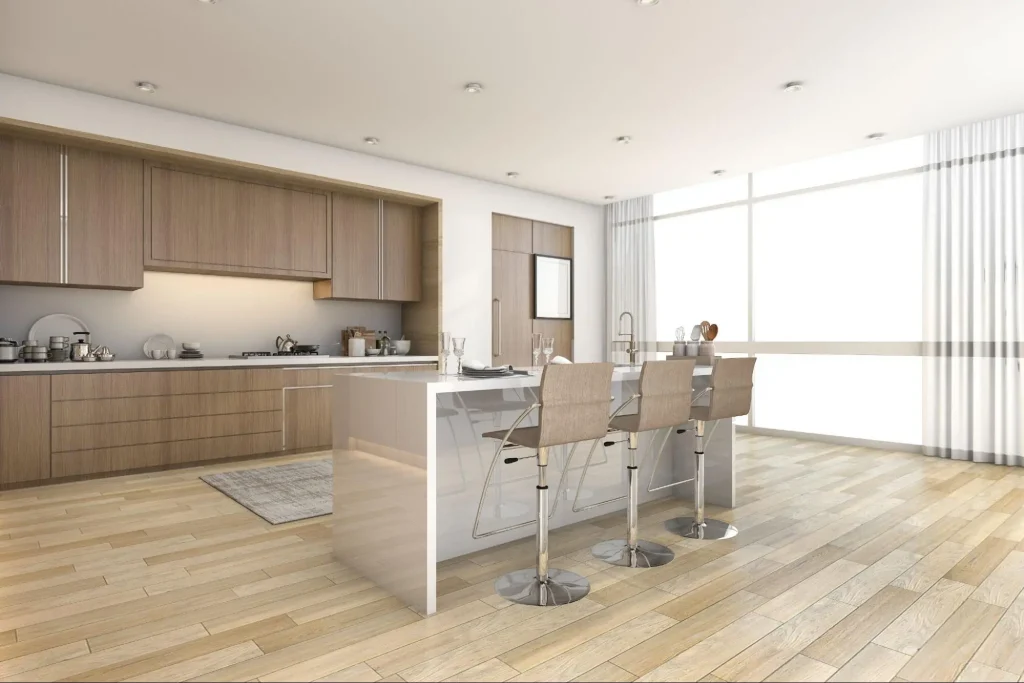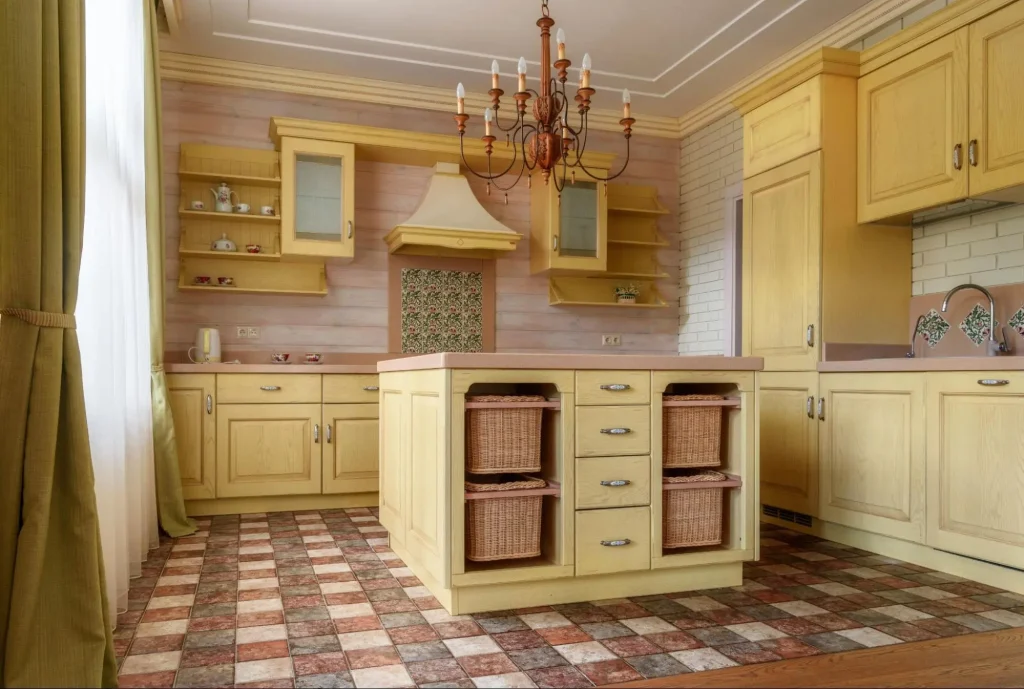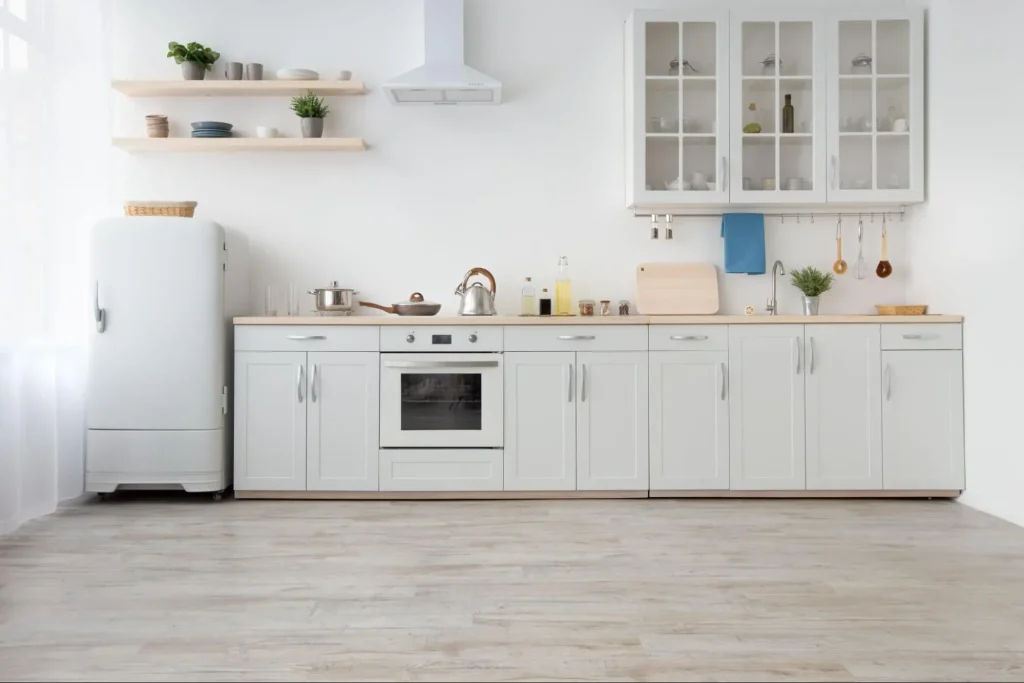
Selecting the right flooring for your kitchen is more than just a matter of taste. It’s a balancing act between functionality, style, and budget. Your kitchen floor must be able to withstand the rigors of everyday use, from spills and crumbs to heavy foot traffic. It’s the foundation that brings together your kitchen’s aesthetic and this high-traffic area’s functionality. With so many materials to choose from, each with its unique benefits and considerations, finding the perfect fit for your lifestyle and design vision requires careful thought.
The market offers a plethora of kitchen flooring options, ranging from budget-friendly choices to premium materials. While some might prioritize durability and ease of maintenance, others might lean towards visual impact and comfort underfoot. Similarly, installation can be a DIY project for some materials, while others might necessitate professional installation to ensure longevity and performance. Understanding these variables will help you make an informed decision about which flooring material is the best for your kitchen.
Ceramic tile is a popular choice for kitchen floors due to its durability and water resistance. Available in a vast range of colors, patterns, and sizes, ceramic tiles can be laid in various intricate designs to create a unique look. They are also very easy to clean, making them ideal for a space where spills are common

Hardwood floors bring warmth and a timeless look to any kitchen. Whether you choose oak, maple, or walnut, hardwood can be finished in various stains and styles to match your home décor. Additionally, if they get scratched or worn, hardwood floors can be refinished rather than replaced.
Vinyl flooring is a budget-friendly option that doesn’t skimp on style. Modern vinyl comes in sheets, tiles, or planks and can mimic the look of natural materials like hardwood and stone. It is also softer underfoot compared to tile and wood, providing more comfort during long cooking sessions.

Linoleum is made from natural materials, making it an environmentally friendly option for the eco-conscious homeowner. It’s biodegradable, anti-bacterial, and comes in a variety of colors and patterns.
Concrete flooring offers a sleek, modern look and can be stained, polished, or textured to enhance your kitchen’s design. It is extremely durable and provides a seamless look.
Porcelain tiles are denser and more water-resistant than ceramic tiles, making them ideal for kitchens. They are also very hard-wearing and less prone to scratches and chips.
Bamboo flooring is another eco-friendly option, known for its strength, durability, and stylish appearance. It offers a unique look and can be a conversation starter due to its sustainability.

Selecting the right flooring for your kitchen hinges on understanding your lifestyle and how you use your kitchen. Your choice should withstand the demands of traffic and harmonize with your kitchen aesthetics.
Your kitchen is a high-traffic area, often standing as the busiest room in your home. Durability is a must. When considering kitchen flooring materials, opt for options that can handle the wear and tear of heavy foot traffic. For families or frequent entertainers, scratch-resistant and easy-to-clean floors like high-quality vinyl or tile can be especially beneficial.
For busy households, choose materials known for longevity and ease of maintenance.
In homes with pets, slip-resistant and scratch-proof options should be a priority.
Traffic Patterns:
Note that the pathways most traveled in your kitchen and select flooring that accommodates constant use.
When choosing the perfect flooring for your kitchen, it’s important to weigh the advantages of each material against your household’s specific needs and preferences. Consider factors such as durability, maintenance, comfort, and aesthetic appeal. Whether you prioritize eco-friendliness, ease of cleaning, or the timeless beauty of natural materials, there’s an option that will align with your lifestyle and enhance the heart of your home.
In summary, your kitchen flooring decision should balance practicality with personal style, creating a space that feels both inviting and efficient. Remember, the right flooring can transform your kitchen into a welcoming hub for cooking, dining, and socializing, while also boosting your home’s value. If you’re ready to take the next step in remodeling your kitchen, reach out to Kaminskiy Care and Repair today. We offer professional advice and services to help maintain the quality and extend the life of your Kitchen flooring.
For high-traffic areas in your kitchen, consider materials like ceramic tiles or concrete flooring, which are hard-wearing and easy to clean.
Hardwood and natural stone are among the most durable choices, offering robustness along with timeless appeal. These materials can withstand the rigors of a busy kitchen when properly sealed and maintained.
Waterproof flooring options ideal for kitchens include vinyl tiles and luxury vinyl planks. Their water-resistant properties make them suitable for areas prone to spills and moisture.